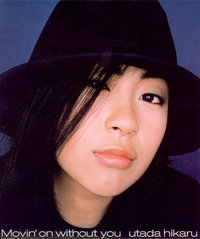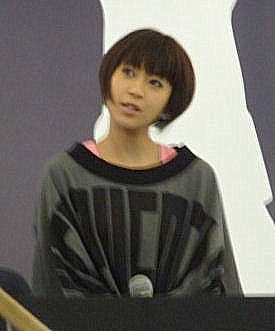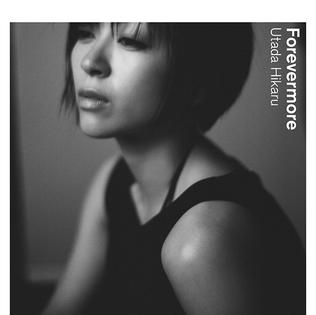
Hikaru Utada, who is also known by the mononym Utada, is a Japanese-American pop singer, songwriter and producer. Utada has become one of the most influential and best-selling musical artists in Japan.

First Love is the debut Japanese-language studio album by Japanese-American recording artist Hikaru Utada, released on March 10, 1999, by Toshiba-EMI.

Exodus is the second English-language album by Japanese-American singer-songwriter Hikaru Utada, released on September 8, 2004 by Island Records under the moniker Utada. Her first English-language album called Precious was released under the name "Cubic U". After being discovered in North America by Island CEO Lyon Cohen when she contributed to the Rush Hour 2 soundtrack, he was very interested in signing Utada to his record label and she eventually accepted the offer. She traveled to Los Angeles to sign the contract and began recording the studio album straight after her signing. However, during the time frame from 2002 to 2003, Utada was diagnosed with a benign ovarian tumour that needed surgery and treatment. She also married her then-husband Kazuaki Kiriya, which stopped recording temporarily.

"You Make Me Want to Be a Man" is a song recorded by Japanese recording artist Utada for her fifth studio album and second English album, Exodus (2004). It was written and produced by Utada, with co-production by her father Teruzane Utada. The track was inspired by her relationship with her husband at the time, Kazuaki Kiriya. Its themes include sexism and understanding each other from a different perspective. "You Make Me Want to Be a Man" premiered on January 1, 2005 as the fourth and final single from the album. Self-described as an electronic and dance-pop song, it contains numerous elements including J-pop and techno.

"Hikari" is a song recorded by Japanese–American recording artist Hikaru Utada for her fourth studio and third Japanese language album, Deep River (2002). It premiered on March 20, 2002, as the third single from the album in Japan. It was written and composed by Utada, whilst production and arrangement was handled by Utada, her father Teruzane Utada, and long-time collaborator Miyake Akira. The single, and a remix by Russell McNamara, was used as the official Japanese theme song for the 2002 action role-playing video game Kingdom Hearts, and appeared on its original soundtrack respectively. Musically, "Hikari" is a pop folk song. Lyrically, it is about mysteries in life and human activities.

"Movin' On Without You" is a song recorded by Japanese–American singer and producer Hikaru Utada taken from their debut studio album First Love (1999). The song was written, arranged, and produced by Utada themselves, and it became their first ever hit. "Movin' On Without You" was written, produced and composed while Utada was attending college in Tokyo, Japan, during 1997. Utada, who received a record contract by Toshiba-EMI, had written an English-language version of the song, but the song remains unreleased.

The discography of Japanese-American R&B and pop singer Hikaru Utada consists of eleven studio albums, three compilation albums, eleven video albums and numerous singles and promotional singles. Utada began as a musician in the early 1990s as a member of U3, a family unit made up of her, her mother Junko Utada, also known as 1970s enka singer Keiko Fuji, and her father, musical producer Teruzane Utada. U3 released their debut album Star in 1993, with the hope to debut in America. In 1996, the group was rebranded as Cubic U, an R&B project focusing on Hikaru Utada, resulting in the English language album Precious in 1998 with record label Toshiba EMI.

"Come Back to Me" is a pop and R&B song by Japanese American pop singer Hikaru Utada, released under the mononymous moniker Utada. The song was written by Utada and Stargate and was produced by Utada, Stargate and her father, Sking U. "Come Back to Me" is the first single from her second English-language album This Is the One. In the United States, the song has peaked at number five on the Billboard Hot Dance Club Play and number 69 on the Pop 100 chart.

This Is the One is the third English studio album by Japanese American pop singer-songwriter Utada, released by Island Records in the United States digitally on March 24, 2009 and physically on May 12, 2009. The album was originally set to be released in Japan on March 4 but was pushed back to March 14. The album was only released in North America, Japan and some parts of Asia. In Japan, the album topped the Oricon's International Album chart and peaked at number three on the Weekly chart. In the United States, the album peaked at number 69 on the Billboard 200 chart. This Is the One was the supporting album of Utada's 2010 tour Utada: In the Flesh 2010. On December 21, 2009, the "Dirty Desire" remixes were released.

"Automatic" is a song recorded by Japanese–American singer Hikaru Utada, taken as the lead single from her debut album First Love (1999). It was released on December 9, 1998, through Toshiba-EMI in three physical formats: mini CD single, standard-size CD single and 12" vinyl. Additionally, the single included the A-side "Time Will Tell", which originally served as the B-side for these versions. The song was written and co-produced by Utada, while Akira Miyake and the singer's father Teruzane Utada served as producers. Despite working recording in English under the name Cubic U, "Automatic" is Utada's first Japanese recording, and was released after she enrolled into high school in Japan.

"Dirty Desire" is a song by Japanese-American singer-songwriter Utada. The single was released exclusively in the fourth quarter of 2009 as a promotional single to US dance/club radio. The single later received a digital commercial release in December 2009 and peaked on the Billboard Dance/Club Charts at number 16.

"Devil Inside" is Hikaru Utada's second English single, released under the name Utada. It is the second single from Exodus, and the first physical single released in the United States. Though it gained little mainstream attention, "Devil Inside" did do well on dance radio and hit number 10 on the Billboard Hot Dance Airplay chart, making it Utada's most played track in the United States until it was surpassed by "Come Back to Me".

"Time Will Tell" is a song recorded by Japanese–American singer Hikaru Utada, taken as the lead single from their debut album First Love (1999). It was released on December 9, 1998, through Toshiba-EMI in three physical formats: mini CD single, standard CD single and 12" vinyl. Additionally, the single was originally served as a B-side to "Automatic", but was changed into an A-side. The song was written and co-produced by Utada themself, while Akira Miyake and the singer's father Teruzane Utada served as producers. Despite working recording in English under the name Cubic U, "Time Will Tell" is Utada's first Japanese recording, and was released after they enrolled into high school in Japan.

"Hanataba o Kimi ni" is a song by Japanese singer-songwriter Hikaru Utada. It was released digitally 15 April 2016, alongside "Manatsu no Tōriame" as joint singles for her album Fantôme. The song was the theme to the dorama Toto Neechan. The single is Utada's first release since 2012's Evangelion: 3.0 theme song "Sakura Nagashi", and marks her official comeback to the Japanese music scene.

Fantôme is the sixth Japanese studio album by Japanese-American singer-songwriter Hikaru Utada. Although Utada announced an indefinite hiatus from the public eye in August 2010, she continued writing and composing material with her father, Utada Teruzane, and long-term collaborator, Miyake Akira. Musically, Fantôme contains a collection of tracks that utilizes acoustic and stripped-down instrumentations, alongside influences of pop, electronic, and R&B music. The lyrical content delves into themes of grief, sadness, love, and death—mostly influenced by the death of her mother, her second marriage, and the birth of her son in 2015.

"Forevermore" is a song by Japanese American singer-songwriter Hikaru Utada. It is their second single under the label Epic Records, from their upcoming seventh Japanese-language studio album, Hatsukoi. The song was used as a tie-in for TBS dorama Gomen, Aishiteru, their first single used in a drama of a commercial TV station since "Eternally " in 2008. It features the renowned drummer Chris Dave.

"Face My Fears" is a song by Japanese-American singer-songwriter Hikaru Utada and American record producer Skrillex, released on January 18, 2019, by Epic Records Japan. Along with its English-language counterpart, it serves as the opening theme song to the Square Enix video game Kingdom Hearts III. It was written as a collaboration between Utada, producer Skrillex, and R&B songwriter Poo Bear.

One Last Kiss is an extended play by Japanese musician Hikaru Utada, which was released in the US on March 9, 2021. It was released for promotion of the Japanese animated film Evangelion: 3.0+1.0 Thrice Upon a Time around the time of the film's release. It contains all the previously released theme songs that were made for the Rebuild of Evangelion film series. It also contains the theme song "One Last Kiss", which was co-produced by A. G. Cook and released in conjunction with the film on March 10, 2021.

Bad Mode is the eighth Japanese-language studio album by Japanese-American singer Hikaru Utada. It is also her first bilingual album release, with songs in both Japanese and English. It was released on the Sony Music Japan sublabel Epic Records Japan digitally on January 19, 2022, the day of Utada's 39th birthday, and was released physically on CD and limited CD-DVD-BD format bundle on February 23. It marked her first album release in four years.

"Kimi ni Muchū" is a song recorded by Japanese-American singer Hikaru Utada. It was released via Epic Records Japan and Sony Music Japan on November 26, 2021, as one of the several singles for her eighth Japanese studio-album Bad Mode (2022). The track serves as the main theme for the TBS Friday night drama Saiai. It's co-produced by Utada and the British music producer A. G. Cook.




















